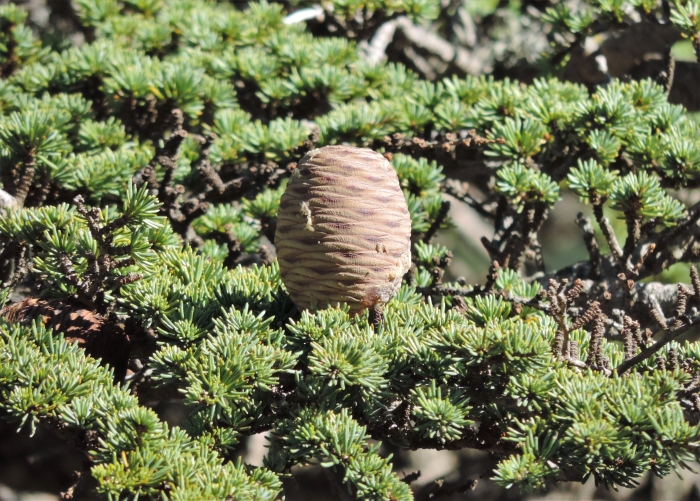Cedar Of Lebanon
(Cedrus libani)
Cedar Of Lebanon (Cedrus libani)
/
/

Krzysztof Ziarnek, Kenraiz
CC BY-SA 4.0
Image By:
Krzysztof Ziarnek, Kenraiz
Recorded By:
Copyright:
CC BY-SA 4.0
Copyright Notice:
Photo by: Krzysztof Ziarnek, Kenraiz | License Type: CC BY-SA 4.0 | License URL: https://creativecommons.org/licenses/by-sa/4.0 | Uploader: Kenraiz | Publisher: Wikimedia Commons | Title: Cedrus_libani_var._brevifolia_kz29.jpg | Notes: Transferred from Flickr via [[Commons:Flickr2Commons|Flickr2Commons]] |









































Estimated Native Range
Summary
Cedrus libani, commonly known as Cedar of Lebanon, is an evergreen tree native to mountainous areas of the eastern Mediterranean, specifically Lebanon, western Syria, and south-central Turkey. It typically reaches up to 40 meters (130 feet) in height and has a massive monopodial columnar trunk up to 2.5 meters (8 feet 2 inches) in diameter. The crown is conical when young, becoming broadly tabular with age with horizontally tiered branches. The bark is dark grey to blackish brown, rough, scaly, and fissured, peeling in small chips. The needles are dark green, and the male cones are showy and purplish, while the female cones are greenish when young, maturing to a pale brown. Cedar of Lebanon blooms in the fall and is particularly noted for its majestic form and longevity.
This species is valued for its ornamental qualities, including its picturesque silhouette and use in large landscapes. Cedar wood is sought after for its fine grain, attractive yellow color, fragrance, and resistance to decay and insects. It is used in parks, gardens, and as a specimen tree. The tree requires full sun and can adapt to a range of soil types, provided they are well-drained. It is drought-tolerant once established but should be watered regularly during the first few years. Cedar of Lebanon is susceptible to cedar rust and might be affected by pests such as the cedar shoot moth. It is not typically invasive but can be slow to establish and grow.CC BY-SA 4.0
This species is valued for its ornamental qualities, including its picturesque silhouette and use in large landscapes. Cedar wood is sought after for its fine grain, attractive yellow color, fragrance, and resistance to decay and insects. It is used in parks, gardens, and as a specimen tree. The tree requires full sun and can adapt to a range of soil types, provided they are well-drained. It is drought-tolerant once established but should be watered regularly during the first few years. Cedar of Lebanon is susceptible to cedar rust and might be affected by pests such as the cedar shoot moth. It is not typically invasive but can be slow to establish and grow.CC BY-SA 4.0
Plant Description
- Plant Type: Tree
- Height: 40-60 feet
- Width: 40-60 feet
- Growth Rate: Slow
- Flower Color: N/A
- Flowering Season: Non-Flowering
- Leaf Retention: Evergreen
Growth Requirements
- Sun: Full Sun
- Water: Medium
- Drainage: Slow, Medium, Fast
Common Uses
Deer Resistant, Drought Tolerant, Fragrant, Rabbit Resistant, Rock Garden, Salt Tolerant
Natural Habitat
Mountainous areas of the eastern Mediterranean
Other Names
Common Names: Lebanese Cedar, Lebanon Cedar, Cyprus Cedar, Libanon-Zeder, Cedro Del Líbano, Cèdre Du Liban, Libanon-Cédrus, Libanonceder, Cedro-Do-Líbano, Кедр Ливанский (Kedr Livanskij)
Scientific Names: , Cedrus libani, Cedrus libani var. argentea, Abies cedrus, Cedrus atlantica var. pendula, Cedrus libani f. nana, Cedrus libani f. pendula, Cedrus libani var. nana, Cedrus libani var. pendula, Cedrus libani var. pendula-sargentii
GBIF Accepted Name: Cedrus libani A.Rich.